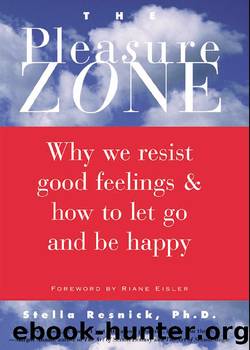The Pleasure Zone: Why We Resist Good Feelings & How to Let Go and Be Happy by Stella Resnick

Author:Stella Resnick [Resnick, Stella]
Language: eng
Format: epub
Tags: Self-Help, Personal Growth, Happiness, Motivational & Inspirational, General
ISBN: 9781609255107
Google: V8Cr1_cQtuYC
Publisher: Conari Press
Published: 1997-08-01T23:42:08.569520+00:00
Night Dreams
Dreams are usually understood to represent significant symbolic messages from as yet undiscovered inner regions of the mind. Freud called dreams âthe royal road to the unconscious,â and most forms of psychotherapy accept the value of studying dreams for clues to feelings, desires, and motivations a client may not have as yet totally owned or acknowledged. But there's a vast resource in dreams that few forms of therapy have yet to tap.
While most people feel somewhat in control of the images that appear to them during their daytime reveries, few people feel that they have any control over the images that appear to them in their dreams at night. Yet a fascinating series of experiments run at the Stanford University Sleep Research Center suggests that some people are capable of âlucid dreamingââbecoming conscious in their dreams while remaining asleep and of directing their dream self in deliberate and desired ways.
Psychologist Stephen LaBerge, working with subjects who can fulfill a previously agreed upon task during a dream, such as counting, singing, or viewing their handsâwhile remaining asleepâhas made some valuable discoveries. Dreams in general, and lucid dreams in particular, have a perceptual vividness and a level of brain wave activity that corresponds more to waking perception than to imagery associated with either imagination or memory. In a sense then, night dreams are more real to us than daydreams. In daydreams we know we're fantasizing, but unless we have a moment of lucidity, we usually don't know we're dreaming when we're asleep.
These findings suggest new possibilities beyond the traditional model that sees dreams merely as opportunities to decode dark urges and primitive forces. You may be able to encourage yourself to become conscious in a dream without waking, confronting issues and making positive choices with issues that are difficult for you in your waking life. Empowering yourself in your dreams can carry over to your effort to strengthen desirable attributes when you are awake.
Here's an example of how one woman in therapy worked on a recurrent dream in a way that gave her self-confidence and positive motivation in her waking life. Leslie, at age twenty-eight, was a determined young woman, married for two years to a man she loved and working at a good job with plenty of promise. But she was troubled about her inability to control her eating at night. Because her looks were important to her, she got up at five every morning to work out at the gym. She went from there to the office and worked a full day, came home late, then, essentially, ate until she went to bed. Her over-control in the morning reinforced her being out of control at night and vice versaâblowing it at night, then punishing herself by being on her best behavior all day long.
Our work in therapy focused on Leslie's extremism, from hypercharged to too stuffed to move. She knew some of her habits came from her struggle as a child, the eldest of three daughters of an alcoholic mother and a stern father.
Download
This site does not store any files on its server. We only index and link to content provided by other sites. Please contact the content providers to delete copyright contents if any and email us, we'll remove relevant links or contents immediately.
Zero to IPO: Over $1 Trillion of Actionable Advice from the World's Most Successful Entrepreneurs by Frederic Kerrest(4571)
Machine Learning at Scale with H2O by Gregory Keys | David Whiting(4313)
Never by Ken Follett(3957)
Harry Potter and the Goblet Of Fire by J.K. Rowling(3857)
Ogilvy on Advertising by David Ogilvy(3622)
Shadow of Night by Deborah Harkness(3368)
The Man Who Died Twice by Richard Osman(3080)
Book of Life by Deborah Harkness(2939)
The Tipping Point by Malcolm Gladwell(2924)
Will by Will Smith(2920)
Purple Hibiscus by Chimamanda Ngozi Adichie(2855)
0041152001443424520 .pdf by Unknown(2846)
My Brilliant Friend by Elena Ferrante(2831)
How Proust Can Change Your Life by Alain De Botton(2814)
How to Pay Zero Taxes, 2018 by Jeff A. Schnepper(2655)
Hooked: A Dark, Contemporary Romance (Never After Series) by Emily McIntire(2555)
Rationality by Steven Pinker(2365)
Can't Hurt Me: Master Your Mind and Defy the Odds - Clean Edition by David Goggins(2341)
Borders by unknow(2315)
